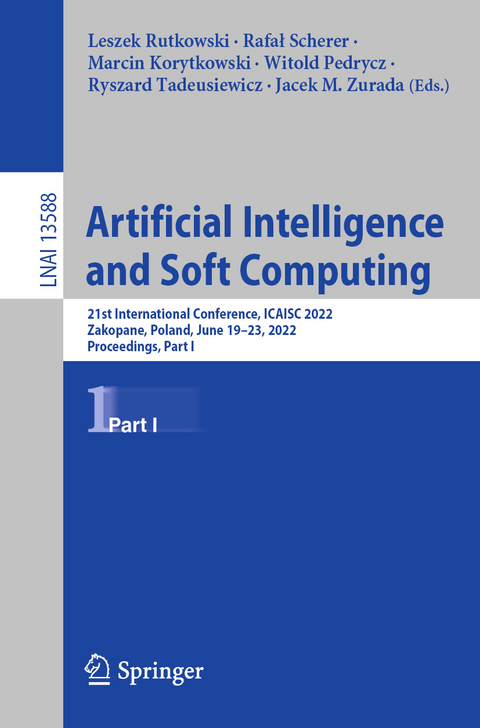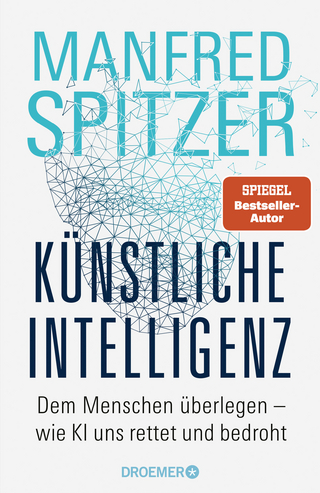
Artificial Intelligence and Soft Computing
Springer International Publishing (Verlag)
978-3-031-23491-0 (ISBN)
The 69 revised full papers presented in these proceedings were carefully reviewed and selected from 161 submissions. The papers are organized in the following topical sections:
Volume I:
Neural networks and their applications; fuzzy systems and their applications; evolutionary algorithms and their applications; pattern classification; artificial intelligence in modeling and simulation.
Volume II:
Computer vision, image and speech analysis; data mining; various problems of artificial intelligence; bioinformatics, biometrics and medical applications.
Neural Networks and Their Applications.- A fast learning algorithm for the multilayer neural network.- A new computational approach to the Levenberg-Marquardt learning algorithm.- Training subjective perception biased images of vehicle ambient lights with deep belief networks using backpropagation- and enforcing-rules supervised.- An Empirical Study of Adversarial Domain Adaptation on Time Series Data.- Human-AI-Collaboration to increase the perception of VR.- Portfolio Transformer for Attention-Based Asset Allocation.- Transfer Learning with Deep Neural Embeddings for Music Classification Tasks.- Analysis and detection of DDoS Backscatter using NetFlow data, hyperband-optimised DeepLearning and explainability techniques.- BiLSTM deep learning model for heart problems detection.- Short Texts Representations for Legal Domain Classification.- Synthetic slowness shear well-logs prediction using supervised machine learning models.- ARIMA for Short-Term and LSTM for Long-Term in Daily Bitcoin Price Prediction.- Multi-objective Bayesian Optimization for Neural Architecture Search.- Multilayer Perceptrons with Banach-like Perceptrons Based on Semi-Inner Products - About Approximation Completeness.- Fuzzy Systems and Their Applications.- Similarity Fuzzy Semantic Networks and Inference. An application to analysis of radical discourse in Twitter.- An Application of Information Granules to Detect Anomalies in COVID-19 Reports.- Type-2 fuzzy classifier with smooth type-reduction.- Evolutionary Algorithms and Their Applications.- A multi-population-based algorithm with different ways of subpopulations cooperation.- Automated Design of Dynamic Heuristic Set Selection for Cross-Domain Selection Hyper-Heuristics.- Evolutionary Approach to Melodic Line Harmonization.- Using Automatic Programming toImprove Gradient Boosting for Classification.- Forced Movement Extensions of the Particle Swarm Optimizers with Inertia Weight.- LQ-R-SHADE: R-SHADE with quadratic surrogate model.- Pattern Classification.- Overload Monitoring System Using Sound Analysis for Electrical Machines.- Employing Convolutional Neural Networks for Continual Learning.- Explaining Machine Learning Predictions In Botnet Detection.- Learning Functional Descriptors Based on the Bernstein Polynomials - Preliminary Studies.- Artificial Intelligence in Modeling and Simulation.- Multiscale Multifractal Detrended Analysis of Speculative Attacks Dynamics in Cryptocurrencies.- A Heuristic Repair Algorithm for the Hospitals/Residents problem with Ties.- The Impact of Data Preprocessing on Prediction Effectiveness.- Convergence of RBF Networks Regression Function Estimates and Classifiers.- A Comparative Study of Genetic Programming Variants.- Optimization of Parameterized Behavior Trees in RTS Games.- Using Answer Set Programming to Improve Sensor Network Lifetime.- Spectroscopy-Based Prediction of In Vitro Dissolution Profile Using Random Decision Forests.- Validation of Labelling Algorithms for Abstract Argumentation Frameworks: The Case of Listing Stable Extensions.
| Erscheinungsdatum | 25.01.2023 |
|---|---|
| Reihe/Serie | Lecture Notes in Artificial Intelligence | Lecture Notes in Computer Science |
| Zusatzinfo | XVIII, 439 p. 117 illus., 91 illus. in color. |
| Verlagsort | Cham |
| Sprache | englisch |
| Maße | 155 x 235 mm |
| Gewicht | 691 g |
| Themenwelt | Informatik ► Theorie / Studium ► Künstliche Intelligenz / Robotik |
| Schlagworte | Algorithmic game theory and mechanism design • Applications • Artificial Intelligence • Computer Networks • Computer Science • computer vision • conference proceedings • Correlation Analysis • Databases • Deep learning • evolutionary algorithms • Genetic algorithms • Informatics • Knowledge Representation and Reasoning • learning • machine learning • Network Protocols • Neural networks • Optimization • Parallel Algorithms • Research • semantics and reasoning • Signal Processing |
| ISBN-10 | 3-031-23491-X / 303123491X |
| ISBN-13 | 978-3-031-23491-0 / 9783031234910 |
| Zustand | Neuware |
| Haben Sie eine Frage zum Produkt? |
aus dem Bereich


